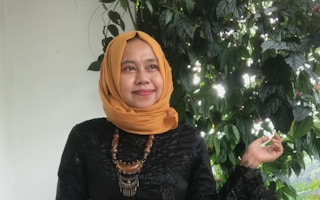A environmental and human rights advocacy group has launched in Indonesia at a time of shrinking democracy and growing pressure on natural resources in the country.
To continue reading, subscribe to Eco‑Business.
There's something for everyone. We offer a range of subscription plans.
- Access our stories and receive our Insights Weekly newsletter with the free EB Member plan.
- Unlock unlimited access to our content and archive with EB Circle.
- Publish your content with EB Premium.
Called Satya Bumi, the non-governmental organisation launches with initial backing from Mighty Earth, a Washington DC-headquartered environmental campaign group that has operated in Indonesia since the mid-2010s.
Satya Bumi’s work will focus on scrutinising the sustainability commitments of large domestic forest-risk companies that are not linked to the international supply chain.
It will be led by Annisa Rahmawati, who was previously an environmental advocate for Mighty Earth. Rahmawati, who has also campaigned for Greenpeace Southeast Asia in her career as an activist, takes on the role of executive director.
She said that Satya Bumi aims to be a “credible independent organisation” that will work with other civil society in Indonesia on environmental protection, business and human rights.
Eight per cent of forest-risk companies in Indonesia have no deforestation, no peatland conversion and no exploitation (NPDE) commitments in place, and Satya Bumi will work to ensure that these voluntary pledges are implemented, Rahmawati told Eco-Business.
“
The international private sector is no longer the leading driver of deforestation in Indonesia; instead the threats are internal.
Mighty Earth
“After the NDPE era, we have seen failings in the implementation of these commitments,” said Rahmawati, pointing out that the “E” in NDPE – exploitation – had been a particular problem that needed addressing in Indonesia’s resources sector.
Indigenous peoples in Indonesia are not adequately protected by law, but the United Nations’ guidelines for human rights and business provided Indonesian NGOs with a “big opportunity” to tackle the exploitation of local communities and Indigenous peoples living in and around forested areas, she said.
Satya Bumi will be working with local communities to help them defend their land, which has become increasingly difficult with the passing of the Omnibus Law. The pro-business law, introduced in 2020, hinders the public’s ability to challenge projects that might cause environmental and social harm.
Mighty Earth announced the launch of Satya Bumi on LinkedIn last week, stating that the threats to Indonesia’s forests were now mainly from domestic rather than international sources. “The international private sector is no longer the leading driver of deforestation in Indonesia, instead the threats are internal,” Mighty Earth said in the announcement.
It added that Mighty Earth will work with Satya Bumi on campaigns, including those on the domestic leakage markets – that is, companies trading deforestation-linked products – and other forest-risk sectors, such as rubber in Jambi and palm oil in Papua.
The NGO’s founder and chief executive Glenn Hurowitz said Mighty Earth was not withdrawing a physical presence in Indonesia, and may continue to hire consultants to work on specific projects. He added that the focus of Mighty’s work would be the “international and private sector.”
The NGO’s major campaigns in Indonesia have included “Burning paradise”, which highlighted heavy deforestation by Korean-Indonesian logging and palm oil conglomerate Korindo in Papua, and work to save the the Batang Toru Ecosystem in North Sumatra.
Campaign NGOs working to protect the country’s carbon-rich forests and people who depend on them have come under growing pressure in Indonesia in recent years – particularly groups with foreign backing.
In 2019, conservation group WWF had its forest conservation licence revoked. The arrest the following year of Phil Jacobson, a journalist for non-profit environmental website Mongabay, marked another move by the authorities to repress environmental defenders.
Indonesia is not the only country in Southeast Asia where civic society groups are under growing pressure. Singapore’s anti-foreign interference law, introduced last year, makes it easier for the government to lean on NGOs. Increasingly autocratic governments have clamped down on NGOs across the region in recent years.








